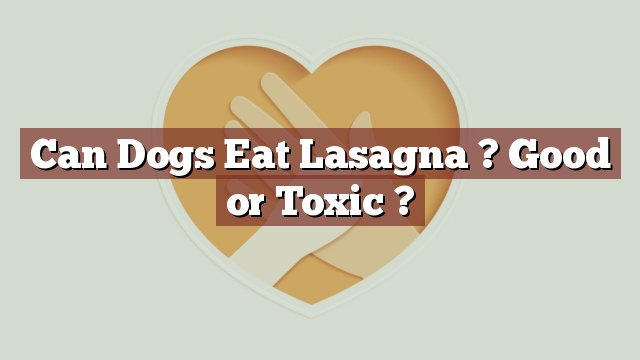Can Dogs Eat Lasagna? Good or Toxic?
Knowing what foods are safe for our furry friends is crucial for their overall health and well-being. In this article, we will explore whether dogs can safely consume lasagna, a popular Italian dish loved by many. We will discuss the nutritional value of lasagna, its safety and toxicity for dogs, potential risks or benefits of dogs consuming lasagna, what to do if your dog eats lasagna, and conclude with considerations regarding whether dogs should be allowed to eat lasagna.
Nutritional Value of Lasagna: What Does it Offer to Dogs?
Lasagna typically consists of layers of pasta, meat, cheese, and tomato sauce. Each ingredient contributes to the overall nutritional value of the dish. Pasta provides carbohydrates for energy, while meat offers protein and essential amino acids. Cheese is a source of calcium and protein, and tomato sauce contains vitamins A and C. However, it’s important to note that the nutritional value of lasagna may differ depending on the specific recipe and ingredients used.
Can Dogs Eat Lasagna? Exploring its Safety and Toxicity
Can dogs eat lasagna? The answer is no, dogs should not consume lasagna. While some ingredients in lasagna may be safe for dogs in moderation, the combination of pasta, meat, cheese, and tomato sauce can pose several risks to their health.
Pasta, particularly when cooked, is not harmful to dogs in small amounts. However, the high carbohydrate content can lead to weight gain and potentially contribute to digestive issues. The meat used in lasagna is often seasoned and cooked with various spices, such as onions and garlic, which are toxic to dogs. Cheese, although a good source of calcium and protein, can be difficult for dogs to digest due to its lactose content. Additionally, tomato sauce often contains onions and garlic, which can be toxic to dogs and may cause gastrointestinal problems.
Veterinarians and scientific studies advise against feeding lasagna to dogs due to the potential risks associated with its ingredients. It is best to keep lasagna away from your canine companion’s reach.
Potential Risks or Benefits of Dogs Consuming Lasagna
Feeding lasagna to your dog can lead to various risks, including digestive upset, pancreatitis, and toxicity from ingredients such as onions and garlic. Dogs may experience symptoms such as vomiting, diarrhea, abdominal pain, and in severe cases, anemia or organ damage.
On the other hand, there are no significant health benefits for dogs consuming lasagna. Dogs have different dietary requirements than humans, and their nutritional needs are best met through a balanced diet specifically formulated for their species.
What to Do if Your Dog Eats Lasagna: Steps to Take
If your dog accidentally consumes lasagna, it is important to take prompt action. Contact your veterinarian immediately for guidance. They may recommend inducing vomiting if the ingestion occurred recently or advise on further steps based on your dog’s size, health condition, and the amount ingested. Never attempt to induce vomiting without professional guidance.
Conclusion: Should Dogs be Allowed to Eat Lasagna? Considerations.
In conclusion, dogs should not be allowed to eat lasagna due to the potential risks and toxicity associated with its ingredients. While some components may be safe individually, the combination of pasta, meat seasoned with harmful spices, cheese, and tomato sauce can be harmful to dogs’ health. It is essential to prioritize their well-being and provide them with a proper, balanced diet that meets their nutritional needs. If you have any concerns about your dog’s diet or suspect they have ingested harmful substances, always consult with your veterinarian for appropriate guidance.
Thank you for investing your time in exploring [page_title] on Can-Eat.org. Our goal is to provide readers like you with thorough and reliable information about various dietary topics. Each article, including [page_title], stems from diligent research and a passion for understanding the nuances of our food choices. We believe that knowledge is a vital step towards making informed and healthy decisions. However, while "[page_title]" sheds light on its specific topic, it's crucial to remember that everyone's body reacts differently to foods and dietary changes. What might be beneficial for one person could have different effects on another. Before you consider integrating suggestions or insights from "[page_title]" into your diet, it's always wise to consult with a nutritionist or healthcare professional. Their specialized knowledge ensures that you're making choices best suited to your individual health needs. As you navigate [page_title], be mindful of potential allergies, intolerances, or unique dietary requirements you may have. No singular article can capture the vast diversity of human health, and individualized guidance is invaluable. The content provided in [page_title] serves as a general guide. It is not, by any means, a substitute for personalized medical or nutritional advice. Your health should always be the top priority, and professional guidance is the best path forward. In your journey towards a balanced and nutritious lifestyle, we hope that [page_title] serves as a helpful stepping stone. Remember, informed decisions lead to healthier outcomes. Thank you for trusting Can-Eat.org. Continue exploring, learning, and prioritizing your health. Cheers to a well-informed and healthier future!

